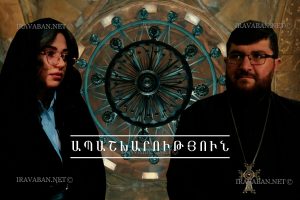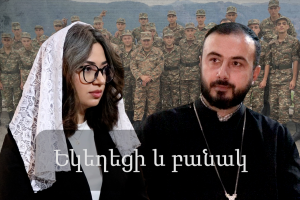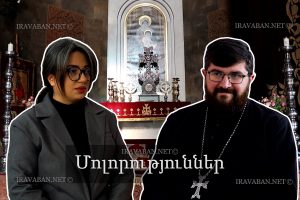Within the framework of “The Church and the Law” series of interviews Iravaban.net talked about Christianity with the Abbot of Khor Virap Monastry Padre Isahak Poghosyan.
– What is Christianity?
– Especially recently, there are many opinions. Some plead with revolution, some with globalization. These are opinions, maybe they have the right to exist, but essentially, Christianity is the story of the relationship between man and God. More precisely, the story of bringing a person closer to God.
– Father Isaac, what is the difference between religion and faith?
– All religions are essentially meant to make people know God. Faith is a more internal, deeper experience, and if we talk about practical faith, there are also many testimonies in this sense. The lives of the saints, the path taken by many of the church fathers, many realities that find a place in our everyday life are also meant to harden us in our faith, to confirm us on the path of our faith. By believing, we become convinced of our principles, of the path we have chosen.
-According to our Constitution, the Republic of Armenia recognizes the unique mission of the Armenian Apostolic Holy Church as a national church in the spiritual life of the Armenian people, in the development of its national culture and preservation of its national identity. However, there is also an opinion in the society that the Armenian Apostolic Holy Church should not have a special status, what is your opinion and does the current special status help in any way?
– Being enshrined in the constitution is essentially or just a fact, a document that the Armenian Church has a special mission and status among us, but even if it was not enshrined, it is no secret for us how important our church has been in our lives. At different times, different opinions may come to life among the people, but the mission of our church is unequivocal for us, and I think it is also for our sake. And if our society is familiar, well-informed, and related to its history, such opinions will not appear in our society. Now that you mention that there are such opinions, it is the best indication that the latter, in fact, are not aware of the history and past of their own church, their own people, because such questions should never arise in the presence of an informed person. Considering also our current existence, including political, we should not diverge into extremes, we should not be guided by artificial, false agendas, but on the contrary, we should embrace, include, be based on straight, precise, honest values, and continue our life and mission in that way. We (ed. clergymen) are busy with our issues, our agenda, our prayer, our literary, scientific and other interests. Now let’s accept for a moment that the Constitution does not state that the church has a special mission, very little will change in my life or in the life of many people like me, not to mention in the life of our people. The church will not be hit, if we concentrate, the hit will be to our people, our state, our statehood, because sometimes we document with concern or are witnesses of the soul-stealers, false preachers, these have been there since the day of the church’s foundation, and these are not only among us. These were and will be. The best way to combat them is to know your own history.
How did it happen that the church assumed the leadership of the people? When we did not have a state, statehood or our state, statehood was threatened. If we say correctly, when our kings and princes were not in their place, the church tried to fill that gap, but it was so lasting and often and the church performed such an important function that until today everyone appreciates and speaks out.
When Nerses Ashtaraketsi was organizing the defense of Yerevan, Etchmiadzin, Sardarapat, what interest did he have? When Gevorg the 5th did not leave Etchmiadzin, what ambition did he have? There are many examples. The church has never had special ambitions and cannot have any, because the mission of the church is in a completely different field. These are artificially created problems, as they were, are and will be.
– Freedom of activity of religious organizations is guaranteed in the Republic of Armenia by the Mother Law, as well as religious organizations are considered independent from the state. What do you think about this regulation and can it have negative consequences?
– Neither the church is forced in what it does, nor is the believer forced in what he does. This is such a natural reality that sometimes I find it difficult to understand the logic of these questions. As for us, it is not a matter of examination and doubt regarding our devotions and sanctities. We have a father, a mother, children, we have sacred sanctities, including our church, as well as the mission of the church, where it is possible, where it is not possible, for me there is no such question. If once our struggle was with foreigners or against foreigners or against foreign doctrines, now our problem is with the children of our people.
“Only the national church can preserve the national identity.” Do you agree with this idea and in what way does it contribute to it?
– Look, our church has such a quality: a national church. Do you know of any other church that has this quality? Because Christianity is essentially a cosmopolitan, national religion, and we have appropriated Christianity, Armenianized it, if you pay attention, our architecture, our theology, everything we have is Armenian, original, and distinctive. People who are interested in understanding our identity are usually pleasantly surprised. The church contributes to the development and prosperity of all fields known to us with everything it has. As a rule, when we go to church, we learn good things, we do not learn bad things.
– What is justice?
– Justice is the longing of our search for God.
– What is morality?
– Probably our sincerity.
– What is faith?
– Faith is the evidence of things hoped for (Apostle Paul).
– To what extent are justice, morality and faith interconnected?
– Any honest life is interconnected.
Details in the video.
Hasmik Sargsyan






































